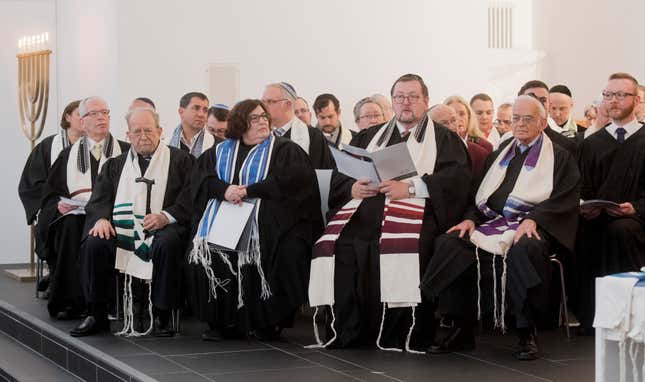Jewish Leaders: Banning Abortion is ‘Absolutely’ a Violation of Religious Freedom
As Roe v. Wade hangs in the balance, many in the Jewish community argue that their religion not only permits abortion access, but requires it.
AbortionPolitics

Conservatives—namely, white evangelical Christians—have long weaponized religious values as a shoddy defense for their decades-long conquest to criminalize abortion in the United States. But after a leaked draft of the Supreme Court’s decision to strike down Roe v. Wade sent shockwaves through the public consciousness on Monday night, a different kind of group of religious text-swinging heroes has emerged.
Coalitions of Rabbis across different sects of Judaism and a contingent of Jewish abortion activists are defending Jewish pregnant people’s right to abortion access, raising what they claim is a valid legal challenge: A national abortion ban would violate their right to religious freedom as guaranteed by the First Amendment. And as the right to bodily autonomy for women and pregnant people is threatened—largely impacting low-income Black and brown people—by conservative justices’ arguments that we should simply rewind to the good old years when women didn’t have any rights because, you know, some 17th century witch-hunter said so, Jewish communities are putting their foot down to say, “Not in my religion.”
Rabbi Sandra Lawson, who’s based in North Carolina, spelled this out to Jezebel during an interview this week: “‘Kavod HaBriyot’ translates to human dignity and ‘B’tzelem Elohim’ means created in God’s image. Both teach us that we must honor the dignity and autonomy of each person, and that includes giving each person the ability to make decisions about their bodies and their lives.”
Rabbi Danya Ruttenberg, Scholar in Residence at the National Council of Jewish Women who focuses on religious texts around sexuality and bodily autonomy, admits that Judaism is a patriarchal religion and that there are plenty of places in the Torah that don’t get it right; through a reproductive justice lens, however, much of the Jewish religion can be interpreted as in support of the right to choose. “The question here is not just about abortion justice and centering those most impacted by abortion bans and their needs, but thinking about the right to have children, to not have children, to have bodily autonomy, and to raise the children you have in safe and sustainable communities,” she told Jezebel in a phone interview Tuesday. “To that end, Flint’s drinking water is a reproductive justice issue, cops not shooting your kid down in the street is a reproductive justice issue, housing, food security, and so on. When you start looking at a Torah with a reproductive justice lens, you start to see all sorts of things that maybe you didn’t see before.”
For evidence, Rabbi Ruttenberg points to the Book of Exodus in the Torah, which discusses a case where two men accidentally knock over a pregnant person and cause them to miscarry:
“When men fight, and one of them pushes a pregnant woman and a miscarriage results, but no other harm ensues, the one responsible shall be fined when the woman’s husband demands compensation; the payment will be determined by judges. But if other harm ensues, the penalty shall be life for life.”
The Hebrew Bible, she says, does not regard the fetus as a person, for the Torah doesn’t specify how long the woman has been pregnant when the miscarriage happens. Another annotated text states, “If she is found pregnant, until the fortieth day it is mere fluid,” meaning the fetus does not have agency for at least forty days of pregnancy. For that reason, some interpretations of Jewish law say that personhood begins with the first breath. “It’s not murder, basically, and the Talmud lays that out really explicitly,” she says.
Of course, different sects have translated the word “harm” in a number of ways. A more liberal reading of the passage might suggest that “harm” could mean harm to mental health or economic status, or that any general negative impact from an unwanted pregnancy would be grounds for abortion, while a conservative or more traditional definition might simply mean physical or medical harm. But the Mishnah, the second-most authoritative text after the Torah, says that the mother’s life takes precedence over the fetus’ life very clearly, Rabbi Ruttenberg says. “Abortion is explicitly not only permitted in Judaism, but required when the pregnant person’s life is in danger,” she clarifies. “We do not push up one life for another.”
-

-

-

-

-

-

-

-

-

-

-

-

-

-

-

-

-

-

-

-

-

-

-

-

-

-

-

-

-

-

-

-

-

-

-

-

-

-

-

-








































